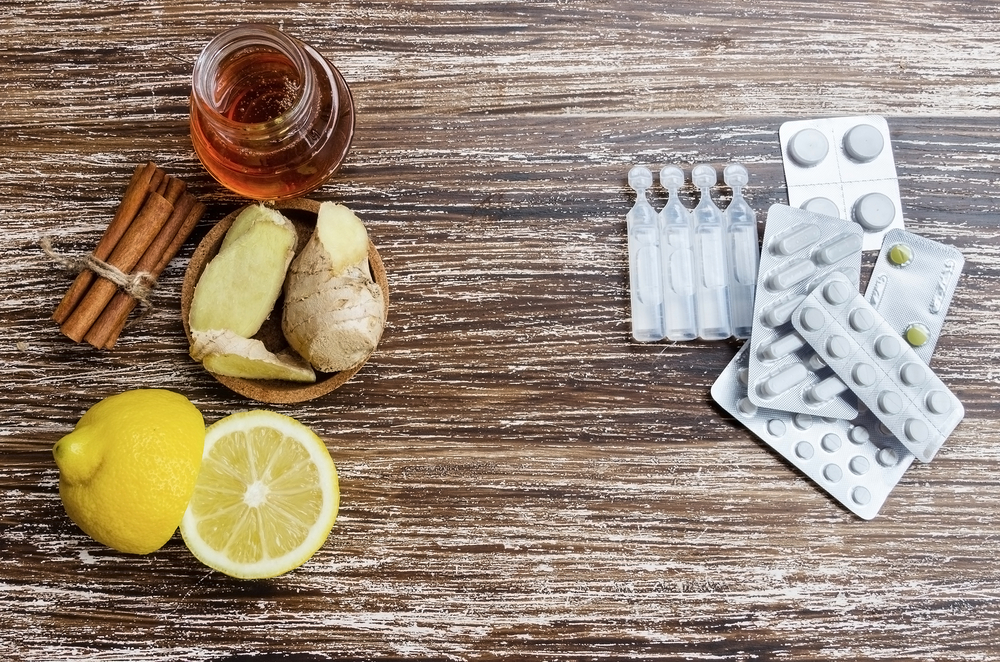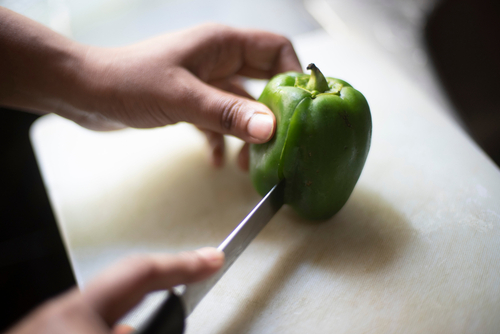I remember back in the day that my mother was the chief cook, the budget master, and the only practitioner when it came to home medicine.
Just like many kids of my generation, before going to the doctor, we used to cry “mom!” and it was usually the main person to cure our ailments.
It seems that in recent years a lot of households across America have turned their eyes to herbal medicine once again, and many are regaining their lost confidence in home medicine.
Herbal concoctions are being pulped and powdered and distilled into balms and pills and elixirs that are starting to rival the popularity of the myriad over-the-counter chemical medicines and at the same outlandish prices.
In fact, some of the most effective and natural medicines of all can be found in your kitchen, and every cupboard holds valuable resources. The herbs and spices in your kitchen can prove useful if you know how to use them.
Herbal medicine should not be frowned upon, and those that do it are usually ignorant people. If it weren’t for plants, we wouldn’t have today remarkable medicine such as aspirin, penicillin, myriocin, and quinine, just to name a few.
There’s very little difference between learning to cook with herbs and learning to cure with them, and when the knowledge of the two are combined, a person can cook up some of the most delicious cures known to man.
Herbal remedies are valuable because they are where we need them when we need them the most. You just have to open your kitchen cupboard, and you will certainly find what you need.
This article doesn’t claim that any of the herbs discussed in this article will produce miracles. They won’t cure cancer or heart diseases, but I found out over the years that these remedies are effective for most common illnesses. They are worth keeping a good supply of in any household.
Home remedies for intestinal distress
Only a few medicines that I’ve taken over the years have had an immediate effect. However, when it comes to herbal medicine, there is a common culinary herb that can give immediate relief to one of the most annoying occurrences of all – flatulence.
Few pains are sharper or more acute than severe flatulence (gas) resulting from a blockage in the intestines. When such an attack occurs and has the patient doubled over, it can be quickly dispelled by one cup of sage tea.
All you need to do is to simply cover a heaping tablespoon of sage leaves with one cup of boiling water. Let it steep for five minutes or so until the tea gets a bright yellow color (if it gets too darker, the tea will be bitter). You can drink the tea as is or ad half a teaspoon of honey, and you will be surprised by the results.
Tip: When preparing the turkey for Thanksgiving, try some traditional stuffing that uses sage to benefit from its anti-flatulent properties.
An alternative to sage tea is the one made from seeds of sweet anise. From the crushed seeds of sweet anise comes the oil that is the main flavoring for the licorice candy we all know. In Middle-Eastern countries, after bountiful meals, anise seeds are served to discourage the formation of gasses caused by excessive eating.
Brew as you would sage tea, using a level teaspoon instead, and let steep for 10 minutes. You don’t need any sweetening since anise seeds are naturally sweet. Some other useful herbs for the expulsion of gas are basil, cinnamon, nutmeg, and mace.
There is no single cure for the common cold, the most common affliction of all, but even so, there are a number of herbs that can lessen the symptoms and at least make one feel more comfortable (and as anyone sick will tell you, feeling comfortable is the first cousin to feeling well).
The most commonly used remedy for cold was horseradish back in the day. The medicinal properties of horseradish are listed as follows: expectorant, diaphoretic, antiscorbutic, diuretic, and stimulant.
In layman’s terms, horseradish is a very effective medicine for loosening phlegm in the head and the chest. It also helps the body to work up a good sweat, thereby combatting the fever. Horseradish is very high in vitamin C, and it will draw blood to the surface that it touches, aiding greatly in the healing of sore throats.
It also helps cleanse the body of toxic wastes and helps raise the patient’s energy level ever so slightly. To make this herbal medicine, one can mix freshly ground horseradish half-and-half with catsup and serve it on baby shrimp in a bowl of watercress.
Battling the Flu season
Flus, like colds, seem to run their cycles, especially this time of year. When most people come down with the flu, they give up to a few days of misery. One of the major advantages of herbal home remedies is the treatment of the flu
People feel miserable when catching the flu, and they don’t want to visit a doctor since most of them see it as a waste of money. They all want to feel better, and by using herbs, they can do some fighting back. Thyme comes to the rescue in most cases.
Thyme is a member of the mint family and is a savory herb used to season various dishes. However, thyme is also one of the most soothing herbs for an upset stomach. It also acts as a cough suppressant, and this herb is the “secret” ingredient in most commercial cough syrups.
Doing a gargle of thyme also does wonders for a sore throat. This is due to its active component “thymol,” a powerful antiseptic that researchers have shown to be 26 times more potent than phenol.
As part of the mint family, thyme is one of the safest herbs in your kitchen, and there should be no fear of taking too much of it. Since it is safe, this also makes it somehow weak, and it often needs to be made strong to benefit the most of it.
For my own homemade thyme syrup, I take 1/2 cup dried thyme and pour one pint of boiling water over it, then leave sit for 20 minutes. At the end of this time, I strain off the remaining dark-colored liquid, then I add 1/2 cups of light-colored honey and gently heat until the honey is dissolved.
You can store the syrup in a sterilized jar and let it in the refrigerator to cool and use it when needed. It lasts for two weeks, so you don’t have to worry about it. I recommend taking two tablespoons at a time, 3-4 times a day.
Besides thyme, ginger can also do wonders for congestion. You can also add a freshly grated tablespoon of ginger to your thyme cough syrup.
Tip: In case you suffer from seasickness, take two capsules of powdered dry ginger since it is twice as effective as prescription pills.
Dealing with stress
This time of the year is stressful for all of us, no doubt about it. With the pandemic, the election, and the coming of the “blizzard” season, most people just can’t take it anymore. They do not get enough rest, they are angry all the time, and they end up suffering from insomnia.
To deal with insomnia, a recommended herbal remedy is rosemary. It is well-known for its calming effects, and a tea made from rosemary, taken an hour before going to bed, will do wonders.
It’s best not to take rosemary any sooner before sleeping as its mildly diuretic property might otherwise have one up in the middle of the night looking for the bathroom: which is rather anti-productive for sleep.
Rosemary has been used for centuries in relieving stress-induced headaches. Even the Romans wove wreaths of it to wear about their heads.
For relieving pains of a different sort, cloves are as delicious as they are helpful. Oil of cloves has long been employed in the treatment of toothaches, and that same numbing oil can help beat the aches and pains brought on by flu or from just plain overdoing it.
When you make tea from cloves, the anesthetic oil works its way through the kidneys, liver, and bronchial membranes, stimulating, relieving pain, and disinfecting as it goes.
Clove oil was often used during WWII to promote a healthy appetite and help the digestion process. The cloves are known to promote salivation, and it can help to deal with picky eaters.
Healing with capsicum
The king of the herbs, in my opinion, is without doubt, capsicum. Also known as cayenne, capsicum is one of the finest of all healing herbs. I often ad a sprinkling of cayenne to my hot beverages during my winter camping trips since it helps warm the body faster than the hot liquid itself.
Capsicum is probably the best and safest heart tonic, able to increase the circulation of blood without speeding the heart. It accomplishes this by enlarging the caliber of vessels, making it easier for the blood to flow through.
Such a reaction makes it a great stimulant since it speeds up the body’s natural immune defense and aids the recovery of the patient. Cayenne is often used in conjunction with other herbal remedies since it helps the herbs act faster, and the relief brought by these remedies occurs quicker.
There is a common misconception that cayenne “burns,” even though your mouth, lips, and tongue will tell you otherwise. In reality, capsicum is never harmful and can be eaten in large quantities.
Cayenne has even been prescribed for stomach ailments as serious as ulcers. Its rubefacient quality draws blood to the stomach lining that needs healing, and its stimulant quality gets it there quicker.
The “burning” sensation most of us are feeling is actually just that, a “sensation,” and is caused by capsaicin, an enzyme that excites nerve endings. Furthermore, nothing beats capsicum for producing a really good sweat to sweat out impurities, foiling cold germs in the beginning stages, making it truly hot stuff as a medicine!
Concluding
The herbs listed in this article are just a few of the herbal remedies you can find in your kitchen cupboard. You may very well have many other herbal remedies inside your home without knowing about them.
Knowledge of home medicine is what will keep us alive when modern drugs or professional help is not available. Learn how you can treat the most common illnesses with what you have lying around since you never know when you might have to use such treatments.
>>> GET THIS BOOK TO DISCOVER MORE <<<


























































































Thank you, Bob. The simplest and most basic remedies are Always my First Choice. Take Care.
Ginger kills colds by drying up the sinuses. Rosemary is used in European cooking because of food poisoning. A little goes a long way because too much is toxic.. Zinc beats vitamin C for killing viral infections. Cloves are very antibacterial. Food is medicine.